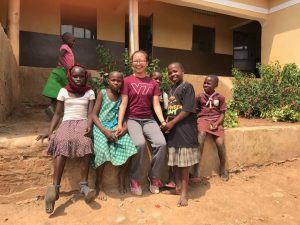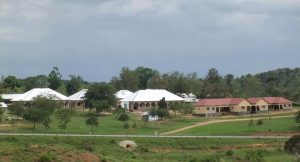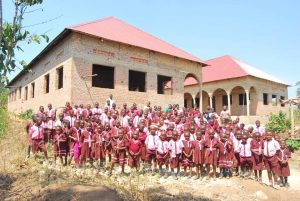13 year old girl frightened by her HIV+ results and seeks sponsorship
It was a heartbreaking moment when Priscila, 13 years old, received frightening results that she was HIV+. She burst into tears and cried out “I am going to die.” It was a tough moment as the counselor tried to help her deal with the shock. Priscila, like many other children, contracted the virus from her parents as an infant. She has been having health difficulties but had never had the opportunity to get tested for HIV. Priscila was introduced to a group of other children who are HIV+ in a special care and peer support program at Uganda Care! who shared experiences with Priscila and helped her to gain some strength and courage to deal with the unfortunate news. This group meets regularly to receive counseling and peer-support through sharing experiences and engaging in fun activities. Her father died of AIDS and her mother’s health is also declining. Priscila and her mother currently live with her Aunt.
group of other children who are HIV+ in a special care and peer support program at Uganda Care! who shared experiences with Priscila and helped her to gain some strength and courage to deal with the unfortunate news. This group meets regularly to receive counseling and peer-support through sharing experiences and engaging in fun activities. Her father died of AIDS and her mother’s health is also declining. Priscila and her mother currently live with her Aunt.
Priscila dropped out of school in Primary two (grade 2). Despite fighting this terrible disease, Priscila still has the zeal to continue her education given a chance. She would be grateful if someone comes to her aid and offer sponsorship which would enable her to attend school and also obtain support for transport costs to the clinic to receive regular treatment and counseling. If you can help, please email John Mary at jmlugemwa@ugandaruralfund.org or call 763-291-1102.
On August 14th, URF organized a free HIV testing for the people of Kyetume and the surrounding villages. 126 people were tested. Earlier in the year during March, URF conducted the same exercise and 300 people got tested. URF partners with Uganda Care! which sends health personnel to administer the testing. After testing, Uganda Care! provides free treatment and counseling. However, URF facilitates the patients’ transportation in case of those who cannot afford expenses to the Masaka clinic.
HIV/AIDS epidemiological trends in Uganda
Uganda was among the first hard hit countries. The first HIV/AIDS case was identified in the country along the shores of Lake Victoria in 1982. Superstitions and witchcraft characterized the initial response from communities amidst lack of clear government response to HIV/AIDS. Consequently, the epidemic progressed very fast to all parts of the country initially concentrating in urban and semi-urban centers.
By end of 1992, the national prevalence rate was estimated at 18.3% with some centers registering rates above 30%. This was followed by a period of steady decline in prevalence rates from the mid 1990s to 2002 to around 6%, attributed to favorable prevention policies. The country has since experienced stabilizing prevalence rates over the last years with threats of increases in some parts of the country.
The 2004/05 National HIV/AIDS sero and behavior survey by the Ministry of Health Surveillance Unit estimated about 915,400 adults and children were living with HIV/AIDS in 2005. Prevalence among adults aged 15-49 yrs was estimated at 6.4%, 0.7% among children less than 5 years, and 5.8% among those aged 50-59. The Ministry of Health estimated 132,500 new infections in 2005 alone.
Since 1982 when the country’s first cases of HIV were detected on the shores of Lake Victoria in Rakai district, cumulatively an estimated 2.6 million Uganda have been infected and 1.6 million have lost their lives to HIV/AIDS related illnesses including 76,000 in 2005 alone. For many years, AIDS has been and is still a leading cause of adult disease and deaths. It is the fourth leading cause of under-5 mortality, directly influencing the realization of MDG goals. Adult life expectancy currently is at 48.9 years (50 years for females and 48 years for males) yet it is projected to have been 56.9 years without AIDS. AIDS is cited among the leading causes of poverty in the country.
The NHSBS estimated a total of 2.18 million Ugandan orphans by end of 2005. About 47% of these and 81% of the 567,700 dual orphans are due to AIDS.
(taken from Uganda AIDS Commission http://www.aidsuganda.org/)



